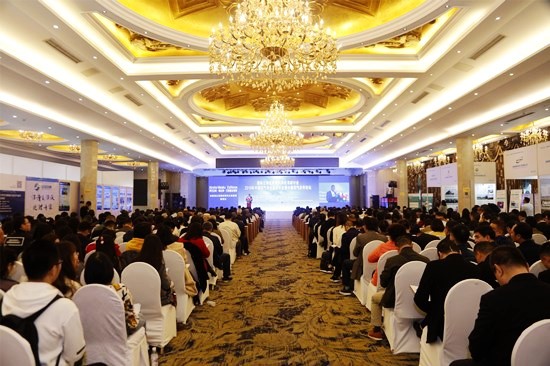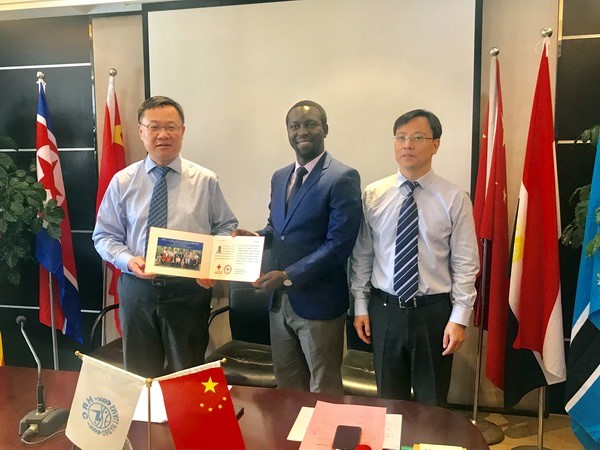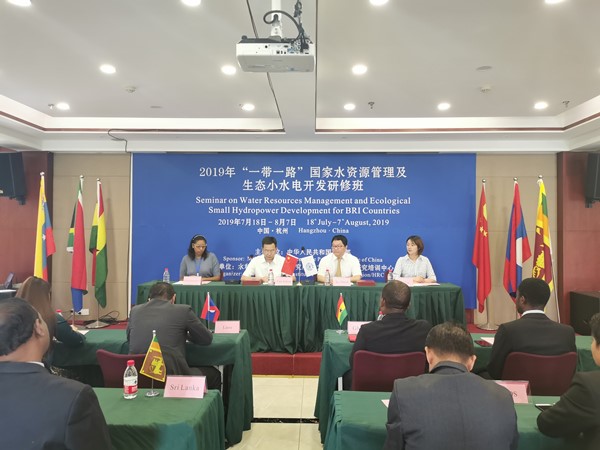Editor's note:
This year marks the 75th anniversary of the founding of the United Nations, a 193-nation body that began with 51 signatories, including China, at the end of the Second World War. Let's take a look at how China plays its role in the United Nations and how it has honored its commitments to the purposes and principles of the U.N. Charter, as well as how it has helped the U.N. respond to global threats in pursuit of peace and development.

Chinese President Xi Jinping delivers a keynote speech at the United Nations Office in Geneva, Switzerland, Jan. 18, 2017.
2019
China became the second largest contributor to the United Nations regular budget.
Sept. 28, 2018
Chinese State Councilor and Foreign Minister Wang Yi addressed the general debate of the 73rd session of the U.N. General Assembly at the U.N. headquarters in New York.
Jan. 18, 2017
Chinese President Xi Jinping delivered a keynote speech at the U.N. Office in Geneva (UNOG), Switzerland. He championed in his speech a world of lasting peace, common security for all and common prosperity, as well as an open, inclusive world and a clean, beautiful world.
2016
China became the second-largest country to share the United Nations' peacekeeping costs.
Sept. 28, 2015
Chinese President Xi Jinping addressed the general debate of the 70th session of the U.N. General Assembly at the U.N. headquarters in New York.

Chinese President Xi Jinping addresses the annual high-level general debate of the 70th session of the United Nations General Assembly at the U.N. headquarters in New York, the United States, Sept. 28, 2015.
July 24, 2015
The Ministry of Foreign Affairs of China and the U.N. System in China jointly issued the Report on China's Implementation of the Millennium Development Goals (2000-2015). According to the report, between 1990 and 2011, China lifted 439 million people out of poverty, reduced the under-five mortality rate by two thirds and the maternal mortality ratio by three quarters, and halved the proportion of the population without sustainable access to safe drinking water and basic sanitation. Meanwhile, China has been actively engaged in South-South cooperation and provided help with its capability to over 120 developing countries in their efforts to attain the MDGs.
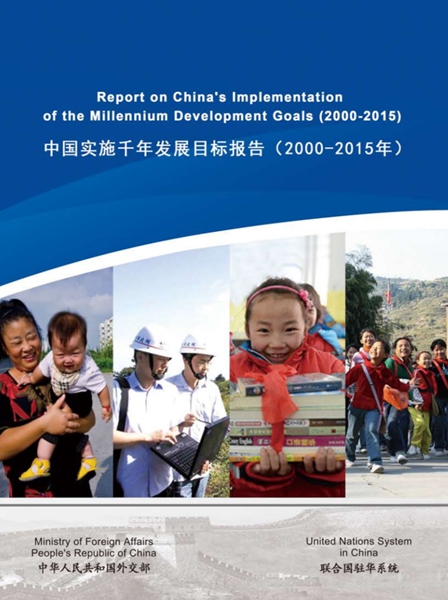
Oct. 15, 2014
Chinese Premier Li Keqiang visited the headquarters of FAO in Rome and announced China's new policies for greater cooperation with U.N. organizations. This was the first time a Chinese premier visited the U.N. organization.

Chinese Premier Li Keqiang (L) meets with Jose Graziano da Silva, director-general of the U.N. Food and Agriculture Organization (FAO), in Rome, capital of Italy, Oct. 15, 2014.
September 2014
The mobile laboratory of the Chinese Center for Disease Control and Prevention (China CDC) dispatched a testing team to Sierra Leone for Ebola hemorrhagic fever testing. It was one of the first foreign laboratories to assist the country in the virus screening.
March 27, 2014
Chinese President Xi Jinping visited the UNESCO headquarters in Paris and delivered a speech expounding on exchange and mutual learning among civilizations and elaborating on the role of the Chinese Dream in promoting Chinese civilization. This was the first-ever visit to the organization by a Chinese Head of State.
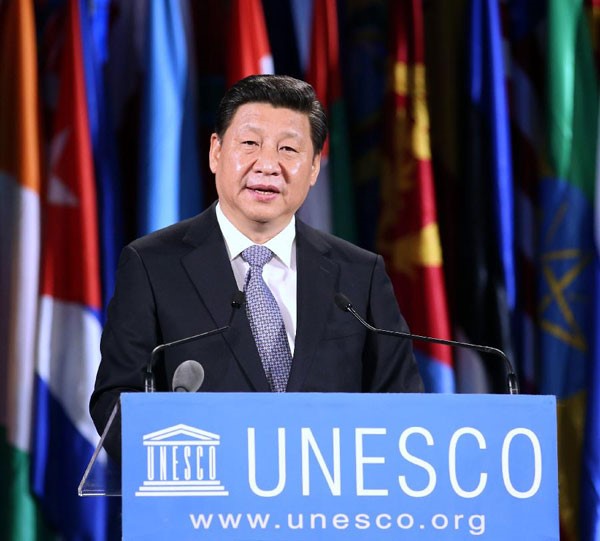
Chinese President Xi Jinping delivers a speech at the headquarters of the United Nations Educational, Scientific and Cultural Organization (UNESCO), in Paris, France, March 27, 2014.
Sept. 25, 2013
Chinese Foreign Minister Wang Yi attended the Special Meeting of the U.N. Millennium Development Goals (MDGs) at the U.N. headquarters in New York and delivered a speech entitled Peace, Development and Cooperation Must be Moved Forward Instead of Backward.
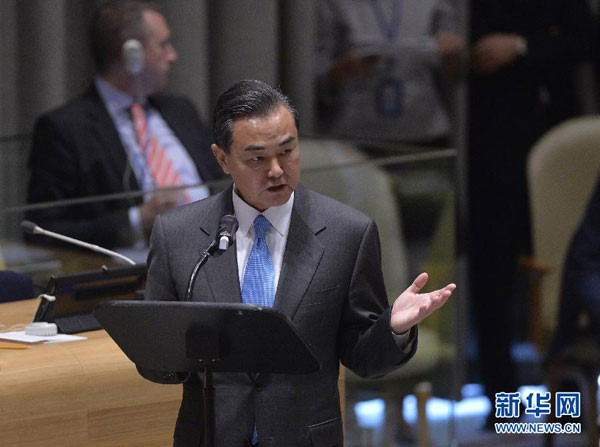
Chinese Foreign Minister Wang Yi addresses a special event on the Millennium Development Goals (MDGs) during the 68th United Nations General Assembly at the U.N. headquarters in New York, Sept. 25, 2013.
Sept. 21-25, 2009
Hu Jintao, then Chinese president, attended a string of U.N. summits, including the U.N. Climate Change Summit, the 64th U.N. General Assembly and the U.N. Security Council Summit on Nuclear Non-proliferation and Disarmament, as well as the G20 Summit.
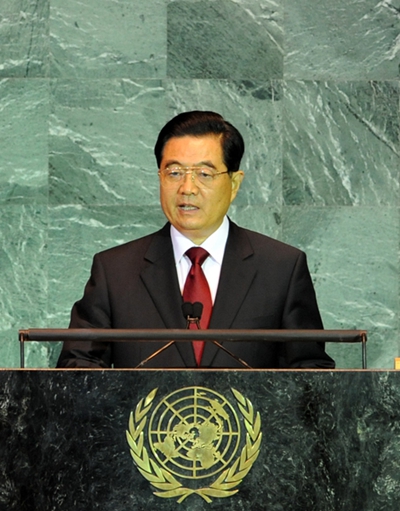
Hu Jintao, then Chinese president, addresses the opening ceremony of the U.N. Climate Change Summit in New York, Sept. 22, 2009.
Sept. 17, 2007
Chinese Major General Zhao Jingmin, a senior officer at the Office of Peacekeeping Affairs in China's National Defense Ministry, took office as Force Commander of the United Nations Mission for the Referendum in Western Sahara (MINURSO), becoming the first Chinese officer to be appointed by the U.N. as a peacekeeping force commander.
May 9, 2006
China was elected as a member of the U.N. Human Rights Council.

Sept. 14, 2005
Hu Jintao, then Chinese president, attended the Security Council Summit on the 60th anniversary of the United Nations and delivered an important speech entitled Maintaining the Authority of the Security Council and Strengthening Collective Security Mechanism. He noted in his speech the U.N. Security Council has an irreplaceable role to play in resolving major global and regional issues related to world peace and security. We should ensure that the Security Council can fulfill its responsibilities under the U.N. Charter.
June 7, 2005
The Chinese government issued the Position Paper of the People's Republic of China on the United Nations Reforms to elaborate its position on U.N. reforms, maintaining that U.N. reforms should be in the interest of multilateralism and enhance the U.N.'s authority and efficiency, as well as its capacity to deal with new threats and challenges.
May 2003
The Security Council adopted Resolution 1483 by a vote of 14-0, ending 13 years of U.N.'s economic sanctions against Iraq. China voted in favor of it.
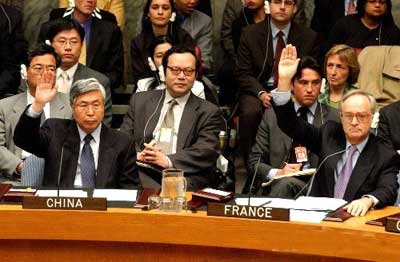
Wang Yingfan (L, front), China's Permanent Representative to the United Nations, votes in favor of the U.N. Security Council Resolution 1483, May 22, 2003.
September 2000
Jiang Zemin, then Chinese president, attended the U.N. Millennium Summit and delivered an important speech, where he elaborated on China's position on promoting the lofty cause of world peace and development, democratizing international relations, strengthening the role of the U.N. and upholding the purposes and principles of the U.N. Charter. He also called for the common development and prosperity of all nations in economic globalization.
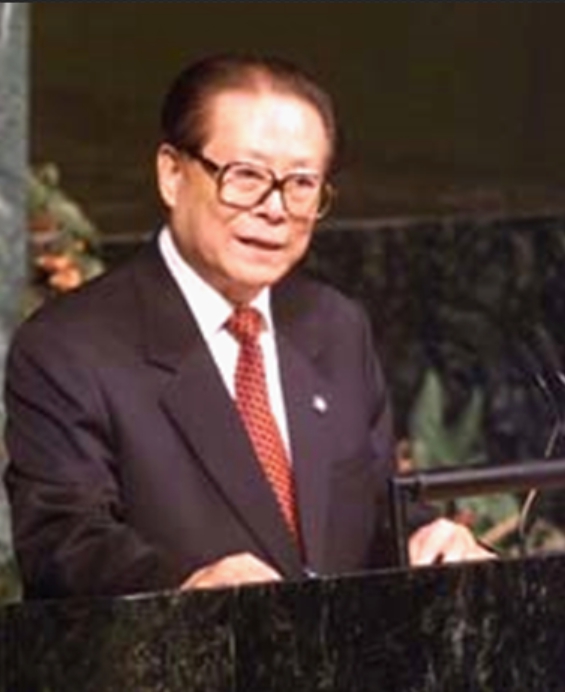
Jiang Zemin, then Chinese president, delivers an important speech at the U.N. Millennium Summit, Sept. 6, 2000.
January 2000
The Chinese government dispatched 15 civilian police officers to the United Nations Transitional Administration in East Timor (UNTAET). This was the first time Beijing sent civilian police to carry out a U.N. peacekeeping operation.

October 1995
Jiang Zemin, Chinese President at that time, delivered a speech at a meeting marking the 50th anniversary of the United Nations. He was the first Chinese head of state to address the United Nations.
April 1990
China sent five military observers to join the work of the United Nations Truce Supervision Organization (UNTSO) in the Middle East. It was the first time China participated in U.N.-led peacekeeping missions.

1988
China joined the U.N. Special Committee on Peacekeeping Operations and thereby laid the groundwork for becoming a key player in the field of peacekeeping.
1984
-China became a member state of the International Atomic Energy Agency (IAEA).
-Ni Zhengyu was elected as a judge by the International Court of Justice (ICJ), becoming the first representative of China on the court since the founding of New China.
1983
China became a member of the World Tourism Organization (UNWTO).
1980
-China became a member of the International Fund for Agricultural Development (IFAD), and since then, it has been one of the largest recipients of IFAD assistance.
-China joined the World Intellectual Property Organization (WIPO) and the U.N. Committee on the Peaceful Uses of the Outer Space.
April 1974
Deng Xiaoping, head of the Chinese delegation, delivered a speech at the Sixth Special Session of the U.N. General Assembly, in which he clarified China's foreign policy and made a solemn commitment that China would never seek hegemony, nor would China ever seek to become a superpower.

File Photo taken April, 1974 shows Deng Xiaoping, then head of the Delegation of the People's Republic of China, addressing the Sixth Special Session of the U.N. General Assembly.
November 1971
Qiao Guanhua, head of the Delegation of the People's Republic of China, addressed the 26th Session of the United Nations General Assembly. This was the first time a delegation of the People's Republic of China attended the U.N. General Assembly since the founding of New China.
October 1971
The 26th Session of the U.N. General Assembly passed Resolution No. 2758, restoring all the lawful rights of the People's Republic of China in the United Nations.

File Photo shows Qiao Guanhua (L, front), then vice foreign minister of the People's Republic of China, and Huang Hua, then Chinese representative to the U.N., reacting at the 26th United Nations General Assembly.
November 1950
Wu Xiuquan, a representative of the People's Republic of China, made a statement in a United Nations Security Council meeting condemning the United States for its armed aggression in China's Taiwan region. This was the first time a representative of the People's Republic of China attended a United Nations meeting.

File Photo taken on Nov. 27, 1950 shows Wu Xiuquan (L, front), representative of the People's Republic of China, attending the general assembly of the first committee of the United Nations.
April-June 1945
Representatives of 50 countries met in San Francisco at the United Nations Conference on International Organization to draw up the United Nations Charter. The Charter was signed on June 26, 1945, by the representatives of the 50 countries. Dong Biwu, a member of the Delegation from China and representative of the Communist Party of China, signed the U.N. Charter at the ceremony.

File Photo taken on June 26, 1945 shows Dong Biwu (front), representative of the Communist Party of China, signing the Charter of the United Nations, San Francisco, U.S.





